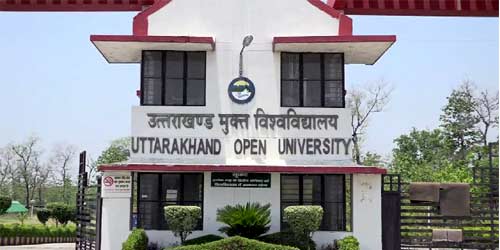Top Hotel Management Colleges in
Haldwani
Are you searching for the top hotel management colleges in Haldwani? Look no further at College Forum, we have compiled a list of the best colleges in Haldwani that offer hotel management courses. Whether you are a local or an out-of-town student, this guide will provide you with all the information you need to make an informed decision about your future education.

Amrapali Institute Of Hotel Management, Haldwani
Total Fees:
₹ 45 K
View Details
Imperial Institute Of Management And Technology – [IIMT], Nainital
Total Fees:
₹ 2.70 L – 3 L
View Details
Kumaun University, Nainital
Total Fees:
₹ 3 L – 3.52 L
View Details
Uttarakhand Open University (UOU), Nainital
Total Fees:
–
View Details
Request For Call Back

Renaissance College Of Hotel Management And Catering Technology –
[RCHMCT], Nainital
Total Fees:
₹ 45 K
View Details
Surajmal University – [SMU]
Total Fees:
₹ 2.70 L – 3 L
View Details
About Course
A management course can cover a variety of topics regarding a broad range of skills important to diverse associations. Homeroom planning, metropolitan administration and improvement, power and the executives, and business organization are among the available courses. Modern office organization, the role of project leads, and individual administration in the digital era are possible additional topics for the executive’s courses. The usage of the executive’s standards in the area of friendliness and the management of authoritative errands in an inn is taught in Neighbourliness
Management courses. The possibility to work in several functional areas, such as food production, food and beverage service, management service, housekeeping, catering, and front office operation, is provided by courses in accommodation management. The greatest Hotel management colleges in Haldwani are fully described by College Forum. By providing general information about the colleges, programs they offered, fee structures, eligibility requirements, syllabuses, career prospectuses, etc., we are assisting you in identifying the best hospitality and management institution.
Benefits of Studying Hotel Management in Haldwani
There are several benefits of doing a hotel management course from Haldwani, a city in Uttarakhand, India, which is known for its thriving hospitality industry and top hotel management colleges. Some of the key benefits include:
Practical exposure: Hotel management courses in Haldwani offer students the opportunity to gain practical exposure to the hospitality industry through internships and projects. This helps students to gain a better understanding of the industry and develop the skills they need to succeed.
Strong industry connections: Hotel management colleges in Haldwani have strong industry connections, which means that students have the opportunity to interact with industry professionals and gain insights into the latest trends and practices in the hospitality industry. This can help them to build a strong network and increase their job prospects.
Specialization options: Hotel management colleges in Haldwani offer a range of specialization options, including hotel operations, food and beverage management, hospitality marketing, and more. This enables students to select a specialization that suits their interests and professional objectives.
Career opportunities: The hospitality industry is growing rapidly, and there is a high demand for trained professionals in the field. Hotel management courses in Haldwani can open up a range of career opportunities for students, including roles in hotels, restaurants, resorts, and other hospitality establishments.
Affordable education: The cost of living and education in Haldwani is relatively affordable compared to other cities in India, making it a popular destination for students who want to pursue hotel management courses.
Overall, doing a hotel management course from Haldwani can provide students with a range of benefits, including practical exposure, strong industry connections, specialization options, career opportunities, and affordable education.
Career Prospects after Hotel Management Course
A career in the hospitality industry can be highly rewarding and fulfilling, especially for those who have completed a hotel management course. Here are some of the top career prospects after completing a hotel management course:
Hotel Manager: A hotel manager is responsible for overseeing the day-to-day operations of a hotel, including managing staff, maintaining the property, and ensuring the highest level of customer service.
Food and Beverage Manager: A food and beverage manager is responsible for overseeing the food and beverage operations of a hotel, including managing the kitchen staff, creating menus, and ensuring the highest quality of food and beverage service. Event Manager: An event manager is responsible for planning and executing events such as weddings, conferences, and other special events held at hotels or other hospitality establishments.
Travel Agent: A travel agent works with clients to plan and book travel arrangements, including flights, accommodations, and activities.
Resort Manager: A resort manager oversees the operations of a resort, including managing staff, maintaining the property, and ensuring the highest level of customer service.
Restaurant Manager: A restaurant manager is in charge of supervising the daily operations of a restaurant, which includes hiring and firing workers, developing menus, and guaranteeing the best possible customer service.
Cruise Director: A cruise director is responsible for overseeing the entertainment and activities on a cruise ship, ensuring that guests have a memorable and enjoyable experience.
Sales and Marketing Manager: A sales and marketing manager is responsible for promoting a hotel or other hospitality establishment, including developing marketing campaigns, managing advertising, and building relationships with clients. Front Office Manager: A front office manager is responsible for managing the front desk operations of a hotel, including managing staff, handling customer inquiries, and ensuring the highest level of customer service.
Overall, completing a hotel management course can open up a range of exciting career prospects in the hospitality industry, from managing hotels and resorts to planning events and marketing hospitality establishments.
Eligibility Criteria
Depending on the school and the particular program, different people may meet different requirements to enroll in a hotel management course. However, some common eligibility requirements are
Educational Qualification: To pursue a hotel management course, the candidate must have completed their 10+2 or equivalent education from a recognized board or university.
Minimum Age: The minimum age requirement for admission into a hotel management course is typically 17 years, and the upper age limit may vary depending on the institution and program.
English Language Proficiency: Candidates should have a good command of the English language, as most hotel management courses are taught in English. Entrance Exam: Some institutions may require candidates to appear for an entrance exam, such as the National Council for Hotel Management and Catering Technology Joint Entrance Examination (NCHMCT JEE), to be eligible for admission. Physical Fitness: Candidates must meet the physical fitness requirements per the standards set by the institution or the industry.
It is important to note that some institutions may have additional eligibility criteria, such as work experience, and candidates are advised to check with the institution’s admission requirements before applying.
Syllabus of Hotel Management Course
The syllabus of a hotel management course may vary depending on the institution and program level. However, some of the common topics covered in a hotel management course are
Food Production: The study of food production involves learning about kitchen equipment, food hygiene, menu planning, and culinary techniques.
Food and Beverage Service: This subject focuses on understanding the various types of service styles, customer service, handling food and beverage complaints, and menu planning.
Housekeeping Management: Housekeeping management involves learning about the various aspects of cleaning and maintaining guest rooms, laundry management, and pest control.
Front Office Operations: This subject deals with managing guest reservations, check-in and check-out procedures, managing guest accounts, and handling guest complaints.
Hospitality Accounting: This subject covers the basics of accounting, budgeting, and financial management in the hospitality industry.
Hotel Engineering: Hotel engineering deals with the maintenance of the hotel’s physical facilities, including electrical systems, plumbing, and HVAC.
Marketing and Sales: This subject focuses on marketing strategies, advertising, and promotions, sales techniques, and revenue management.
Human Resource Management: This subject covers the basics of managing employees, recruitment, selection, training, and performance appraisal.
Tourism Studies: This subject deals with understanding the principles of tourism and the various types of tourism, including adventure tourism, ecotourism, and cultural tourism.
Event Management: This subject focuses on planning and managing various events, such as conferences, weddings, and exhibitions.
It is important to note that the syllabus may vary depending on the institution and program level, and some courses may have additional subjects or specialized areas of study.
Department in Hotel Management
In the field of Hotel Management, there are various departments that work together to ensure the smooth operation of hotels and other hospitality establishments. These departments are responsible for different aspects of hotel operations, and they all play a crucial role in providing high-quality service to guests. Here are some of the essential departments in Hotel Management:
Front Office Department: This department is responsible for managing the reception area, where guests check in and check-out. The front office staff is responsible for handling reservations, managing room assignments, and answering guest inquiries. Housekeeping Department: This department is responsible for maintaining the cleanliness and upkeep of the hotel’s rooms and public areas. Housekeeping staff is responsible for cleaning rooms, changing linens, and restocking amenities. Food and Beverage Department: This department is responsible for managing the hotel’s restaurants, bars, and other food and beverage services. Staff in this department includes chefs, cooks, servers, and bartenders.
Sales and Marketing Department: The task of attracting new customers to the hotel and its offerings fall within the purview of this division. They develop marketing strategies, manage advertising campaigns, and organize events and promotions to attract guests.
Accounting and Finance Department: This department is responsible for managing the hotel’s finances, including payroll, accounts payable and receivable, and budgeting. Human Resources Department: This department is responsible for recruiting, hiring, and training hotel staff. They also manage disciplinary actions, performance reviews, and employee benefits.
These departments work together to ensure that guests have a positive experience during their stay at the hotel. Each department has a specific role to play in ensuring that the hotel runs smoothly and that guests are satisfied with their stay.
FAQ’s
Q1. What are the career opportunities after completing a hotel management course? A1. There are various career opportunities in the hospitality industry after completing a hotel management course, including hotel management, food and beverage service, housekeeping, front office operations, event management, and more.
Q2. What is the eligibility criteria for a hotel management course?
A2. The eligibility criteria for a hotel management course vary from college to college. Generally, a candidate must have completed 10+2 with a minimum of 50% marks from a recognized board.
Q3. What are the benefits of studying hotel management in Haldwani?
A3. Haldwani is home to some of the best hotel management colleges in the country. Studying in Haldwani provides students with an opportunity to learn from experienced faculty members and gain practical training in well-equipped facilities. The city’s scenic beauty and pleasant weather also make it an ideal location for students to pursue their education.
Q4. What is the duration of a hotel management course?
A4. The duration of a hotel management course varies from college to college.
Generally, a diploma course is of 1-2 years, while a degree course is of 3-4 years.
Q5. What is the average salary of a hotel management graduate?
A5. The average salary of a hotel management graduate depends on various factors, including the job profile, company, and location. Generally, a fresh graduate can expect to earn between INR 2-4 lakhs per annum.
Q6. What are the skills required for a career in the hospitality industry?
A6. A career in the hospitality industry requires excellent communication skills, interpersonal skills, problem-solving skills, and the ability to work in a team. A candidate should also have a positive attitude, a willingness to learn, and a passion for the industry.




